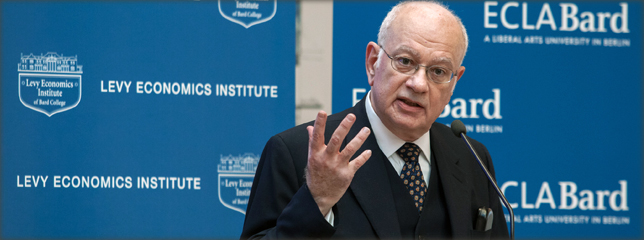
Greek Labour Institute Partnership (2011-14)

-
Strategic Analysis | Μάιος 2021The Greek economy—still fragile due to the lingering effects of the 2009–10 crisis—was hit particularly hard by the COVID-19 pandemic. Greece’s 2020 GDP decline was one of the worst among the group of EU and eurozone member states, along with the highest levels of unemployment and underemployment.
Dimitri B. Papadimitriou, Christos Pierros, Nikos Rodousakis, and Gennaro Zezza update their analysis of the state of the Greek economy on the basis of recently released provisional data for 2020Q4, and model three projections through 2023: (1) a baseline scenario in which no agreement is reached on the disbursement of EU funds (the Recovery and Resilience Facility); (2) a scenario in which EU grants and loans are distributed in a timely manner; and (3) an additional scenario that pairs EU funds with implementation of an employer-of-last resort program. The second scenario would see Greece’s GDP growth return to its pre-pandemic trend—albeit still leaving the economy below the level of real GDP it reached in 2008. The third scenario has the most favorable impact on growth and employment—raising real GDP above its pre-pandemic trend. Failure to achieve a proper recovery of GDP in Greece would be directly related to an absence of fiscal policy expansion.
This Strategic Analysis is the joint product of the Levy Economics Institute of Bard College and INE-GSEE (Athens, Greece). It is simultaneously issued in both English and Greek.Αρχείο:Σχετικό Πρόγραμμα:Συγγραφέας/είς: -
Strategic Analysis | Δεκέμβριος 1969While the effects of the COVID-19 pandemic have been broadly similar for individuals, families, societies, and economies globally, the policy responses have varied significantly between countries. In the case of Greece, the pandemic abruptly ended the country’s fragile recovery and threw its economy into a dramatic contraction beginning in 2020Q2. Fiscal stimulus programs financed by reserve funds and European-backed structural funds have been implemented, but to date there is no evidence of a significant impact. Given the emergence of COVID-19’s second wave of contagion and the economic consequences of business shutdowns and further job losses, our own growth projections, as well as those from the European Commission, IMF, OECD, and the Greek government, have been revised downward for 2021 and prospects for the beginning of a recovery before the end of 2020 have died out.
Using their stock-flow consistent macroeconomic model developed for Greece (LIMG), we run simulations for a baseline scenario and two alternative policy outcomes. The results of the projections for a “business as usual” baseline scenario are pessimistic and show that a V-shaped recovery is not in the cards. The European “recovery funds” alternative scenario projections, while more pessimistic than our report from May 2019, indicate that implementing these funds beginning in 2021Q3 will result in accelerating growth with positive outcomes. A more robust GDP growth rate and consequent employment growth can be realized with the combined effects of the European recovery funds together with an enhanced public job guarantee program. It is this mix of policies that can gain traction and bear fruit in putting the Greek economy on a path to sustainable and inclusive growth.
This Strategic Analysis is the joint product of the Levy Economics Institute of Bard College and INE-GSEE (Athens, Greece). It is simultaneously issued in both English and Greek.Αρχείο:Συγγραφέας/είς: -
Special Reports | Φεβρουάριος 2013
Προγράμματα άμεσης δημιουργίας θέσεων εργασίας σε συνθήκες κρίσης στην Ελλάδα
Δείτε Περισσότερα Δείτε ΛιγότεραΤων Ράνια Αντωνοπούλου, Δημήτρης B. Παπαδημητρίου και Taun Toay

Συγγραφέας/είς: -
Research Project Reports | Οκτώβριος 2012
Ενδιάμεση έκθεση
In this interim report, we discuss the evolution of major macroeconomic variables for the Greek economy, focusing in particular on the sources of growth before and after the euro era, the causes and consequences of the continuing recession, and the likely results of the policies currently being implemented. Some preliminary suggestions for alternative policies are included. These alternatives will be tested in a more robust econometric framework in a subsequent report.
Αρχείο:Σχετικό Πρόγραμμα:Συγγραφέας/είς: -
Research Project Reports | Ιούνιος 2012
Άμεση δημιουργία θέσεων εργασίας για μια ταραγμένη εποχή στην Ελλάδα
Δείτε Περισσότερα Δείτε ΛιγότεραCountries in crisis round the world face the daunting task of dealing with abrupt increases in unemployment and associated deepening poverty. Greece, in the face of her sovereign debt crisis, has been hit the hardest. Remediating employment policies, including workweek reductions and employment subsidies, abound but have failed to answer the call satisfactorily. Direct public-service job creation, instead, enables communities to mitigate risks and vulnerabilities that rise especially in turbulent times by actively transforming their own economic and social environment.
With underwriting from the Labour Institute of the Greek General Confederation of Workers, the Levy Economics Institute was instrumental in the design and implementation of a social works program of direct job creation throughout Greece. Two-year projects, funded from European Structural Funds, have begun.
This report traces the economic trends preceding and surrounding the economic crisis in Greece, with particular emphasis on recent labor market trends and emerging gaps in social safety net coverage. While its primary focus is identifying the needs in Greece, broader lessons for direct job creation are highlighted, and could be applied to countries entertaining targeted employment creation as a means to alleviate social strains during crisis periods.
Αρχείο:Σχετικό Πρόγραμμα:Πολιτική Απασχόλησης και Αγορές Εργασίας, Η Κατάσταση στην Οικονομία της Ευρωζώνης και στην Οικονομία της ΕλλάδαςΣυγγραφέας/είς:
